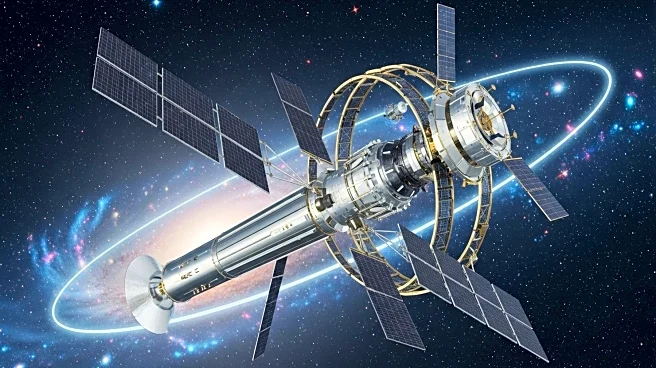What's Happening?
The United States Space Command recently executed a maneuver involving one of its satellites to inspect the Skynet 5A military communications satellite operated by the United Kingdom. This operation, conducted between September 4 and September 12, took place in geostationary orbit at an altitude of 22,236 miles. The maneuver was part of a rendezvous proximity operation (RPO), which allows a spacecraft to approach another for inspection, repair, or docking. The operation was peaceful and conducted under the Multinational Force-Operation Olympic Defender, a coalition including the U.S., Canada, the U.K., France, Germany, New Zealand, and Australia. Major General Paul Tedman of U.K. Space Command highlighted the operation as a significant increase in operational capability, showcasing advanced orbital operations to protect shared national and military interests.
Why It's Important?
This maneuver underscores the U.S. military's ability to conduct orbital warfare, a critical aspect of modern defense strategies. The operation demonstrates the capability to approach and inspect satellites, which could be pivotal in both peaceful and conflict scenarios. The demonstration of such capabilities sends a message to potential adversaries about the readiness and technological prowess of the U.S. and its allies in space operations. The ability to conduct RPOs enhances strategic positioning and deterrence, ensuring that the U.S. and its allies can protect their interests in space. This development is crucial as space becomes an increasingly contested domain, with implications for national security and international relations.
What's Next?
The successful execution of this operation may lead to further advancements in orbital warfare strategies and technologies. The U.S. Space Command and its allies might continue to refine their capabilities, potentially expanding the scope of RPOs to include non-allied spacecraft. This could involve developing orbital interceptors to project military power in space, as previously suggested by Gen. Steven Whiting. The coalition's readiness to conduct dynamic and integrated space operations could influence future defense policies and international collaborations in space security.
Beyond the Headlines
The operation highlights ethical and strategic considerations in space warfare. The ability to maneuver close to other nations' satellites raises questions about sovereignty and the militarization of space. As countries develop similar capabilities, international norms and agreements may need to evolve to address these challenges. The operation also reflects a shift in military focus towards space, emphasizing the need for robust defense mechanisms in this new frontier.









